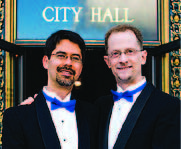 The atmosphere was electric and the excitement and anticipation palpable, as over a thousand LGBT people from all across the country gathered in Washington, DC, on Tuesday for the historic marriage equality arguments before the United States Supreme Court. Plaintiffs from over 30 cases, spanning three decades—from Hawaii to South Dakota to Florida—came to Washington to be there. LGBT people from all walks of life gathered to witness, and participate in, history. The Sisters of Perpetual Indulgence stood beside young LGBT couples with babies nestled on their backs. LGBT people in their 80s and a diverse array of LGBT and supportive religious leaders came. A teenage son of lesbian moms proudly held a sign up high that said, “I have 2 moms—Life is good!” as he stood aside his younger brother and sister.
The atmosphere was electric and the excitement and anticipation palpable, as over a thousand LGBT people from all across the country gathered in Washington, DC, on Tuesday for the historic marriage equality arguments before the United States Supreme Court. Plaintiffs from over 30 cases, spanning three decades—from Hawaii to South Dakota to Florida—came to Washington to be there. LGBT people from all walks of life gathered to witness, and participate in, history. The Sisters of Perpetual Indulgence stood beside young LGBT couples with babies nestled on their backs. LGBT people in their 80s and a diverse array of LGBT and supportive religious leaders came. A teenage son of lesbian moms proudly held a sign up high that said, “I have 2 moms—Life is good!” as he stood aside his younger brother and sister.
High school students in town for the annual “constitution” competition, testing their knowledge of American law, were thrilled to meet the people whose lives these cases would directly affect, and were clearly bewildered and disturbed by the bizarre and hurtful things the smattering of opponents kept yelling. A young lesbian held a sign: “Lesbian girls just want to have FUNdamental rights.” Indeed, a cross section of our diverse community came to Washington to demand just that: our fundamental Constitutional rights. We and others gathered felt a profound sense of pride when we looked up and saw the brave LGBT people who are plaintiffs in the cases ascend with their attorneys the Supreme Court’s white marble steps, gleaming in the bright spring sunshine. They sought what other LGBT Americans and countless other Americans have sought throughout our nation’s history: fulfillment of the promise etched atop the Supreme Court building itself: “Equal Justice Under Law.”
Inside, the Justices pounded the attorneys on both sides of the case with myriad questions, with the Justices often interrupting each other. We were heartened by the fact that a majority of the Justices’ questions and comments seemed to recognize that having equal access to marriage was critical to LGBT people’s dignity. Several of the Justices appeared skeptical of the opponents’ arguments that marriage for LGBT couples would somehow cause heterosexuals no longer to marry or to have children in marriage. Other questions suggested that a majority of Justices perceived accurately that the issue in the cases is the exclusion of same-sex couples from marriage—and not, as opponents claim, simply a benign choice to have marriage only for different-sex couples.
After every Supreme Court argument, people attempt to predict the outcome of the case and what the legal reasoning of the opinion will be. Accurately foreseeing such matters is impossible, and unfortunately, we will have to wait very likely until the last week of June, when the Court annually issues its landmark decisions. Two years ago, the Supreme Court in United States v. Windsor eloquently articulated the harm DOMA caused to same-sex couples essential human dignity, although the Court asked no particular questions on the subject during its hearing on that case. The Court has received over 75 briefs from plaintiff couples, myriad LGBT people and organizations, and other active allies. The briefs cover comprehensively every argument regarding LGBT and marriage equality.
For us and many other LGBT San Franciscans—and, in many ways, the nation—the journey to full nationwide equality began 11 years ago on the steps of San Francisco City Hall, when then mayor Gavin Newsom opened the door for same-sex couples to marry. Over a decade later, that journey has taken us to the steps of the United States Supreme Court. We look to the Court to open the door to nationwide marriage equality, the culmination of this phase of the journey to full equality for LGBT people in every aspect of their lives.
John Lewis and Stuart Gaffney, together for three decades, were plaintiffs in the California case for equal marriage rights decided by the California Supreme Court in 2008. They are leaders in the nationwide grassroots organization Marriage Equality USA.
Recent Comments